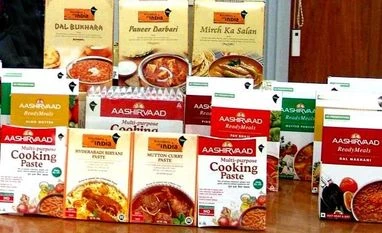The elephant may just have been prepping for a dance. ITC, the fast moving consumer goods (FMCG) major, whose stock has relatively been comatose even as peers and overall markets delivered healthy returns, may be at an inflection point due to its FMCG (non-cigarette business), suggests CLSA.
In a report on Tuesday, Chirag Shah and Nitin Gupta of CLSA said they believe ITC’s FMCG business is firmly on path for a profitable scale-up and expect this vertical to deliver over 26 per cent compounded annual growth (CAGR) in earnings before interest, taxes, depreciation and amortisation (Ebitda) over FY21-24 on the back of industry tailwinds, margin levers and improving asset utilisation.
Over the past four years, Ebitda of FMCG business has grown at an average rate of 50 per cent. Consequently, Ebitda margin has risen 640 basis points (bps) to 8.9 per cent in FY21, which according to CLSA, is likely to improve to 12.5 per cent by FY24. That apart, renewed efforts in the home and personal care segments and leveraging the increased demand for hygiene products should yield good results over the next few years.
“ITC's FMCG business is shaping up well for a K-shape acceleration with scale driving margin expansion even as capital intensity falls. We expect another 362 bps of margin expansion for the FMCG business. This should drive a doubling of its Ebitda to Rs 27 billion (FY21: Rs 13 billion) and RoCE to 20 per cent over FY21-24,” note Shah and Gupta.
As a result, the share of FMCG in ITC’s operating profit is also seen rising. Between FY15 and FY17, its Ebitda share was under two per cent. In FY18 it stood at 3 per cent and since has risen rapidly to 8.7 per cent in FY21. By FY24, CLSA estimates suggest that its share will rise to 12.5 per cent. The brokerage has a buy on ITC with a 12-month target price of Rs 265.
ITC has big aspirations for FMCG business, which has clocked average sales growth of 9 per cent in the past four years, and analysts expect growth rate to improve to 13-14 per cent during FY21-FY24.
In a report last month, Julius Baer analysts said, “ITC has established strong brands (Aashirwad, Sunfeast, Bingo, Yippee, Fiama, Vivel) and it aspires to increase revenues to Rs 1 trillion by 2030 through organic and inorganic growth opportunities.”
While much of FMCG’s growth in the past decade came through organic route, ITC has been open to acquisitions. ITC has acquired Savlon (2015), Nimyle (2018) and Sunrise (2020), and its wide reach helps it scale up acquisitions. In a recent report, Edelweiss said, Savlon has progressively grown 13x and Nimyle by nearly 4x.
Within the existing portfolio, ITC has also been quick to expand into adjacent segments to accelerate growth, a trend expected to continue. Edelweiss said, ITC will also extend its brands such as Aashirvaad and Sunfeast to tap into market opportunities. Aashirvaad, for example, a strong centre-of-plate brand, provides a platform for a larger play in staples and also addresses value-added adjacencies such as organic atta and pulses, gluten free and sugar release control atta as well as vermicelli and instant meal.
Given its scale, ITC can do it with limited incubation costs and faster break-even. Focus on value-added categories is another way of growing topline and margins. Yet, achieving the Rs 1 trillion topline will be tough as it would require 30 per cent CAGR in sales. The jury is out on this.
Meanwhile, the stock has been a laggard on the bourses (see chart). Given the road ahead, 28 of 38 analysts polled by Bloomberg have a buy (1 sell; rest hold), with average target price of Rs 255. CLSA finds the valuation compelling with a record-high P/E discount to the FMCG average (57 per cent) and a 6 per cent dividend yield.
“Falling capex, the asset-light model for its hotel business and a sharp increase in its dividend payout (102 per cent for FY21) should progressively address investor concern over capital allocation. The FMCG business trades at 2.5x FY23 EV/sales (38x implied PE). Valuations are attractive for ITC to consider buyback ($3.7 billion of liquid assets),” CLSA said.
Edelweiss says, ESG-led investing is assuming significance, and ITC is consciously striving to climb up the ESG ladder.
The risks
Despite the positives, there are downside risks, especially given the high share of cigarettes business—48 per cent in revenue, over 80 per cent in profit. An increase in illicit cigarettes, anti-smoking regulations, sharp GST/cess hikes, and aggressive diversification in the healthcare sector are potential risks.
A similar view is shared by Julius Baer and Edelweiss. "Slowdown in the macro-economic environment is a major threat to hotels business. SUUTI stake sale is a likely overhang on the stock," add Edelweiss’ Abneesh Roy and Tushar Sundrani in the note.
Unlock 30+ premium stories daily hand-picked by our editors, across devices on browser and app.
Pick your 5 favourite companies, get a daily email with all news updates on them.
Full access to our intuitive epaper - clip, save, share articles from any device; newspaper archives from 2006.
Preferential invites to Business Standard events.
Curated newsletters on markets, personal finance, policy & politics, start-ups, technology, and more.
)